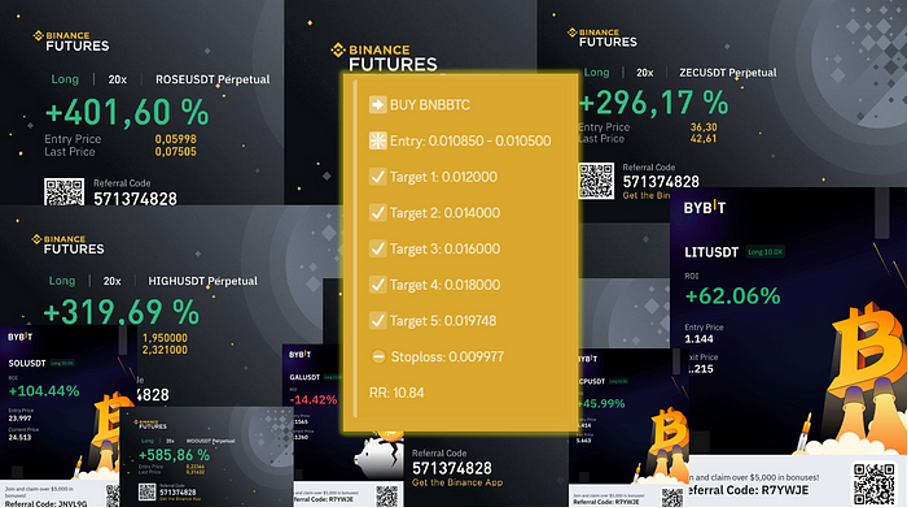Diving into the world of cryptocurrency trading can feel like navigating a vast ocean without a map. That’s where cryptocurrency trading signals come into play, acting as a compass to guide traders through the turbulent waters of digital assets. I’ve found these signals to be invaluable in making informed decisions, especially when the market’s volatility can be overwhelming.
Trading signals provide insights and recommendations on when to buy or sell specific cryptocurrencies, often based on technical analysis or market trends. They offer a sense of direction and confidence, allowing traders to capitalise on opportunities they might otherwise miss. My experience with trading signals has not only enhanced my trading strategy but also broadened my understanding of market dynamics.
In the ever-evolving landscape of cryptocurrencies, having access to reliable trading signals can make all the difference. They empower traders to stay ahead of the curve and maximise their potential returns, turning uncertainty into opportunity.
Key Takeaways
- Cryptocurrency trading signals provide vital guidance for traders, offering insights on when to buy or sell digital assets, thus aiding in navigating the volatile crypto market.
- There are two main types of trading signals: manual, crafted by expert analysts, and automated, generated through algorithms; each offers distinct advantages like strategic human insight and rapid data processing.
- Using trading signals can increase efficiency by automating trades, reduce emotional decision-making, and provide clear entry and exit points, enhancing overall trading strategy.
- Selecting reliable signal providers is crucial for trading success; factors to consider include a provider’s track record, signal accuracy, and transparency in performance metrics.
- While trading signals are beneficial, it is important to be aware of potential risks like reliance on inaccurate signals and the impact of market volatility on signal effectiveness. Balancing signals with personal analysis is essential for successful trading.
Understanding Cryptocurrency Trading Signals
I’ve found that learning about cryptocurrency trading signals can truly enhance my trading skills. These notifications are invaluable, offering insights that help me make informed decisions in a volatile crypto market. Let’s delve into what trading signals are all about.
Definition of Trading Signals
Trading signals are vital notifications indicating when to buy or sell cryptocurrencies. Analysts analyse market data to craft these signals, efficiently assessing patterns and trends. Sometimes, automated systems generate these signals, using intricate algorithms that monitor market activities. In my experience, combining expert analysis with automated insights provides a balanced perspective.
Importance of Trading Signals in Cryptocurrency
Trading signals are crucial for anyone involved in trading. They give clear actions based on market analysis, something that I’ve always found beneficial. When the market’s volatile, signals are guiding stars, often pointing me to profitable trades. They reduce the noise in overwhelming market data. With signals, I anticipate market moves and tailor my strategies accordingly.
Types of Cryptocurrency Trading Signals
Navigating the cryptocurrency market can be daunting. Trading signals have transformed my strategy, providing clear buy and sell recommendations during volatile times. Let’s delve into two primary signal types: manual and automated.
Manual Trading Signals
Manual trading signals arise from expert traders. These professionals delve into market analysis, examining trends and historical data. They employ fundamental and technical tools to forecast movements. The details in these signals specify asset names, buy/sell indications, price points, and risk levels. The human touch behind these signals instils confidence and has often guided my trading decisions effectively.
Automated Trading Signals
Automated trading signals are generated by complex algorithms. These systems analyse vast datasets more rapidly than humans, offering timely alerts. Unlike manual signals, they continuously assess market conditions, adapting to changes instantly. Automated signals include detailed parameters such as entry and exit points. Their precision and speed have streamlined my trading process, allowing me to act swiftly on opportunities without second-guessing.
How to Use Cryptocurrency Trading Signals
Interpreting Signal Data
Understanding how to read signal data is crucial. Signal data usually includes entry and exit points. For example, I often see price targets and stop-loss levels. Analysing this data helps me decide if a signal aligns with my strategy. I look for patterns and align them with broader market trends. Recognising these elements improves my ability to act confidently on trading signals. Some signals prioritize short-term gains, while others aim for long-term strategies.
Implementing Signals in Trading Strategy
Incorporating signals into my trading plan has been a game-changer. I connect my exchange account to a signals platform. This lets me automate trades based on selected signals. Platforms like 3Commas offer tools to create bots. These bots execute trades when conditions match my signals. I adjust settings to manage risk and return. For me, using signals takes emotion out of trading and enhances precision. This systematic approach can increase success rates significantly. I find it’s essential to regularly review signal performance and make necessary tweaks.
Benefits of Using Cryptocurrency Trading Signals
Cryptocurrency trading signals provide clear recommendations for buying and selling. Below are ways these signals can enhance your trading strategy.
Increasing Trading Efficiency
Signals automate trading actions. They integrate with bots to place numerous trades, saving me time. Manual trading would be exhausting, but automation enhances my efficiency. I appreciate timely insights they offer. Signals analyse market trends, providing precise entry and exit points. Structured data in signals simplifies my trading process, avoiding information overload.
Reducing Emotional Decision-Making
Signals minimise emotional trading decisions. Automated systems execute trades based on logic, not emotions. I rely on structured signals to keep my trading strategy aligned. They provide specific stop loss and take profit levels, which helps control impulsive decisions. Following signals keeps me disciplined, reducing stress. This data-driven approach enhances my trading consistency, fostering a calm mindset.
Choosing Reliable Cryptocurrency Trading Signals
Choosing the right cryptocurrency trading signals can significantly boost your trading success. I’ve found that picking the right signal provider is crucial.
Evaluating Signal Providers
Seeking expertise is important when evaluating providers. I prefer services with a solid track record. For instance, Crypto Inner Circle boasts a 92% win rate, while Binance Killers hits nearly 95%. Trustworthy providers like CryptoSignals.org use skilled traders and AI algorithms. I always review their past trades before making any decisions. Transparency matters to me. Binance Killers and CryptoSignals.org offer detailed trade results and analytic insights.
Considering Signal Accuracy and Performance
Accuracy is key in trading signals. Providers like Crypto Inner Circle deliver consistent, high-quality signals. Their performance metrics are transparent. I find that past performance data helps me assess potential profitability. Measuring signal performance is crucial. I feel more confident using services like Token Metrics, which leverage AI to ensure precision. Observing win rates helps me evaluate consistency over time. I choose providers based on their demonstrated accuracy, trusting in their proven performance.
Risks Associated with Cryptocurrency Trading Signals
Navigating cryptocurrency trading signals can be daunting. I’ve found it rewarding, yet it’s essential to be aware of potential risks.
Dependence on Incorrect Signals
Depending heavily on trading signals can be risky. Signals rely on algorithms which may not always be accurate. Flawed data can lead to wrong predictions. Incorrect signals can cause significant losses. I once experienced this when an ill-timed signal led to a substantial loss. It’s crucial to cross-check signals and not solely rely on them. Balancing signals with your own analysis strengthens decision-making. A good mix boosts trading confidence.
Market Volatility Impacts
Cryptocurrency markets are notoriously volatile. Market fluctuations affect signal reliability. High volatility can render signals ineffective. I learned this when sudden market drops impacted my trades despite positive signals. Adjusting to market changes is vital. Embracing volatility as a trader sharpens one’s strategy. Keeping an adaptable mindset allows for better trading outcomes.
Conclusion
Cryptocurrency trading signals have undeniably transformed my trading approach by offering valuable insights and enhancing my strategic decisions. By leveraging both manual and automated signals I’ve managed to navigate the volatile market with greater confidence and precision. Choosing reliable signal providers and integrating these signals into my trading strategy has been pivotal in maximising returns and minimising emotional biases. However it’s crucial to remain vigilant and adaptable in the face of market volatility ensuring that signals are complemented by personal analysis. With the right balance of expert insights and automated systems I’ve found that trading signals serve as indispensable tools in the ever-evolving world of cryptocurrency trading.
Disclaimer: This article is provided for informational purposes only. It is not offered or intended to be used as legal, tax, investment, financial, or other advice.





